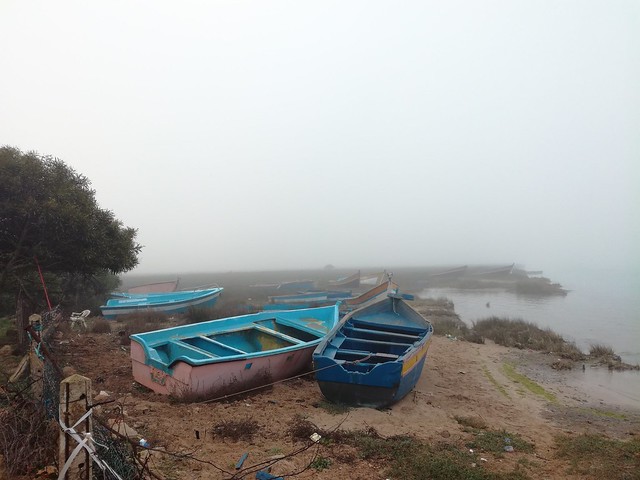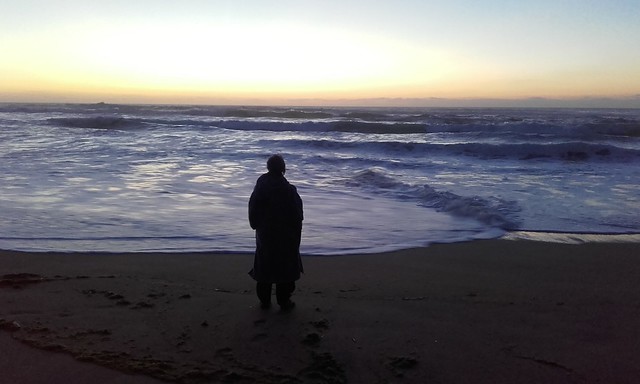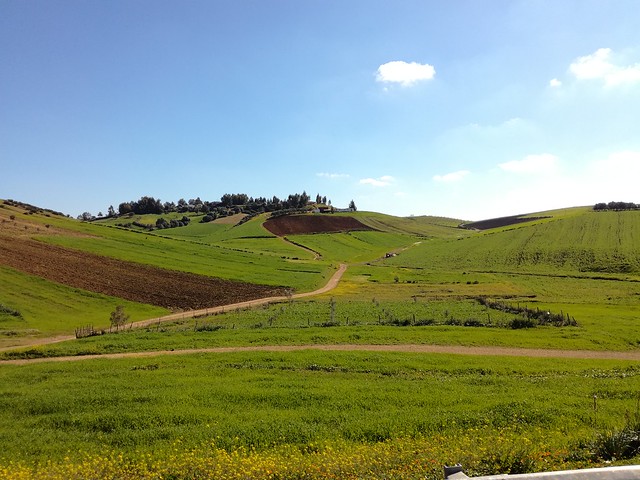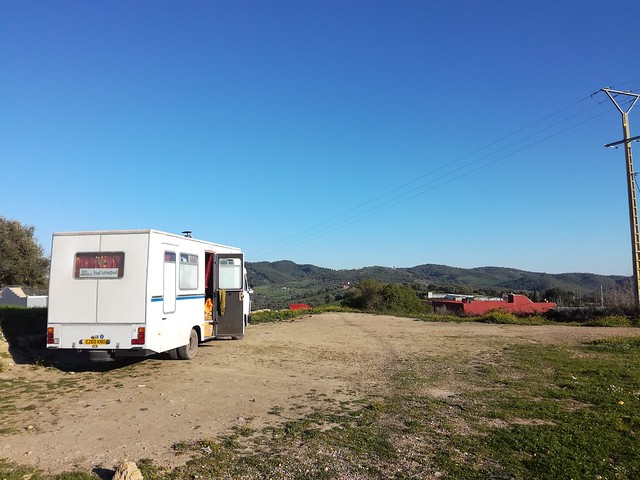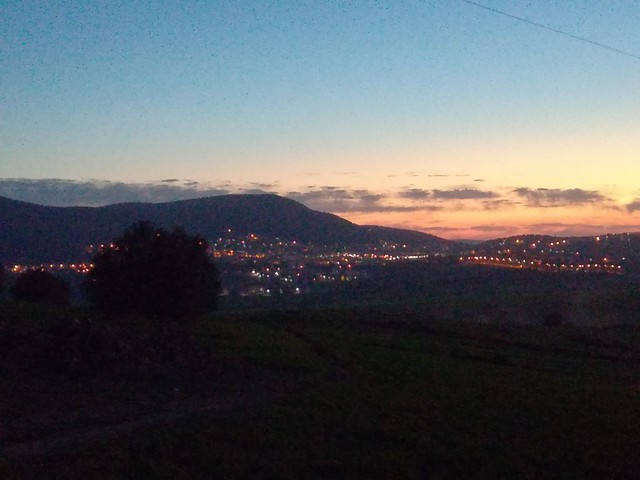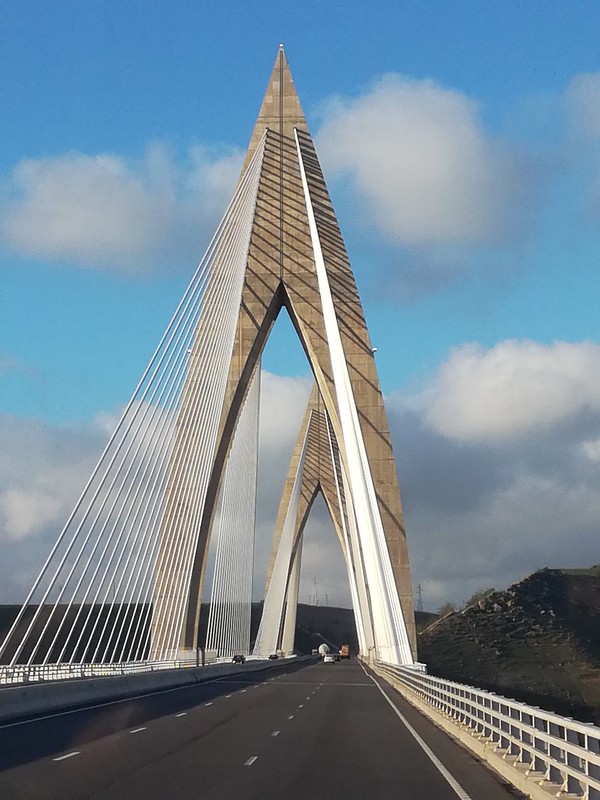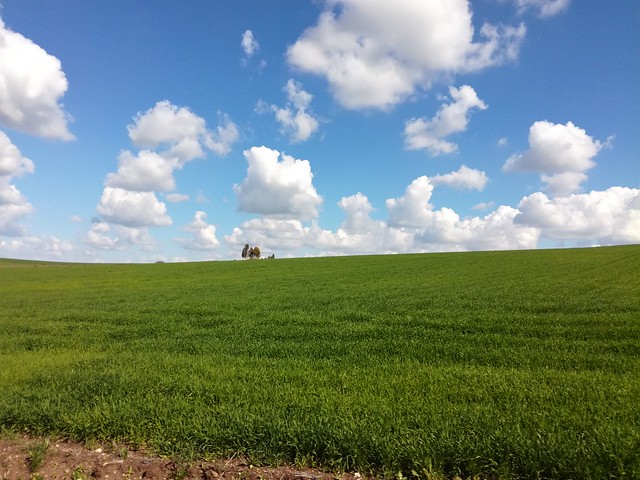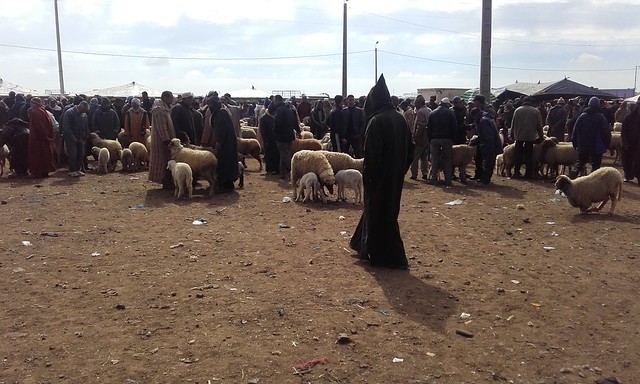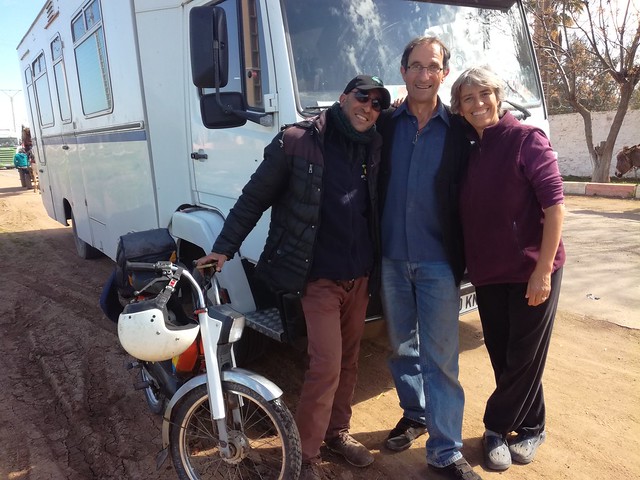US and THEM
As we get closer to Tangier, Frank and I quietly follow our own thoughts, slowly letting go of this amazing country, so full of contrasts. I’ve been mulling over a couple of experiences we had some weeks ago, which I’ve not been able to put into words yet. Today I will try. I will split it into two parts.
Us:
We are in a friendly campsite, run by an educated Berber (with a command of a number of languages, amongst them German), somewhere in the Southern part of Morocco. We’ve had a lovely few days there and are parked up by the taps to refill Emma’s water tank before leaving. Frank is at the back of the van dealing with the water, while I’m in the driver’s seat, looking at the map to determine today’s route. A German couple is by my window, so I say Guten Morgen. I don’t remember what sentence fell next, but it somehow turned a switch in this woman, who started spouting a hateful diatribe about immigrants in Germany. I can’t get a word in edge-ways, she is so keen to foist her views on me. At full volume and using derogatory terms – remember, this is a campsite where the owner speaks German! – she tells me about the problems they bring to Germany.
I’ve been thinking for a long time, whether I should give space to her words in this blog, or anywhere else for that matter. I’m still not sure, but I also feel that we have to face the fact that these mindsets exist, so here we go. Please note, what follows in italics is NOT my point of view, but I am quoting the woman I described above!
She said:
“…of course they all steal like magpies. And they are not interested in working. In our town, we suddenly had 80 immigrants. The local industry gave those Moroccans the opportunity to train for two years, but they walked out after two weeks and went into the black market instead. All they are interested in is money. So they said, “show me how to do a thing and I’ll do it for you and then give me proper money for it. Who needs training?” (note how a nationality turns into a swear word, synonymous for laziness, thievery and thugishness and is used regardless of the actual nationality of the people she speaks about!) A social worker went to a family to talk to the parents about the integration of their children into the school and all the parents wanted to talk about was when they are going to be given a television and a car. And the girls in our town are learning the hard way not to be nice to a stranger. They’ve been raised to smile at everyone, but they are now paying the price for it. They know now to take a weapon with them if they want to go out in the evening, what with all those Moroccans around. And those Kopftuchweiber (I am still struggling to find an adequate translation for such a derogatory term, something like Hijad Hags), I gave them a piece of my mind the other day, when they were walking, three abreast with their arms linked, babbling to each other, not paying any attention to anyone or anything and this poor old German woman with a Zimmer frame has to move out into the road to let them pass. When I had a go at them for being so insensitive, they have the audacity to call me a Nazi! And the other day, a whole horde of men, just walked into a Lidl, took what they wanted and walked out, with no-one able to stop them! In Bottrop (that’s a town in the Ruhr valley, previously thriving on steal industry) they’ve built all these new houses – for whom? Not for the poor Germans who’ve been on waiting lists for years, but no, it’s for the Newcomers! So they get state of the art housing while our socially needy people go empty handed! Where’s the justice in this? Merkel wants to be nice to the immigrants and we Germans have to suffer the consequences. But this is not going to continue much longer, enough is enough. This problem is going to explode.”
Please note, all of this (and more!) was raining down on me in the time that it took Frank to fill our water tank with a hose, and that’s only 65 litres! Meanwhile, her husband was standing by her side, vigorously nodding his head, interjecting a sentence here and there when she had to catch a breath before heading into the next chapter of her diatribe. I am listening, speechless.
Frank climbs into the cabin and I’m barely able to say ‘let’s get out of here’, I’m so overwhelmed by this onslaught and the emotions it has unleashed in me. We leave the Germans in mid-sentence, mid-rant.
It’s some days and many miles later that I’m beginning to be able to think about how I would have liked to respond to this couple. This often happens. It’s so frustrating. I have a very clear feeling in my body, but I’m unable to formulate it into words at the time. I need presence of mind and clear thinking, and instead I have this dread and a kind of thick grey wall, an almost dreamlike sensation of all facilities shutting down, like having to wade through treacle. In those moments, I acutely feel the lack of ability, or maybe lack of tools, to respond in the moment, rather than many weeks later in a blog, when it’s highly unlikely that it will ever reach those for whom it is intended.
Better late than never though, so here are some of the thoughts I’d have liked to have shared with this couple, in the hope that if I ever come across such a situation again, I’d be more responsive:
*If you distrust and hate foreigners so much, why do you come to Morocco for your holidays?
*Do you realise that this campsite’s owner is within earshot? I’m sure you know he speaks German because that would have been the language you used when signing into the campsite, unless you are Arab speakers, which seems highly unlikely.
* I find it strange that per se there should be a higher danger for young German women around muslim men, as my experience here in Morocco was the opposite – I have felt MORE, not less secure as a woman who is not from their culture, when walking around on my own. If there truly is an increased risk, it would be interesting to think about what happens to someone’s values when they leave their own culture. How come these people change so dramatically when they arrive in Europe?
* How much of this gets distorted in the media? Do you draw a line between your own experience and hearsay? What is the role of the media in possibly emphasising the nationality and/or religious affiliation of a person as and when it suits them to create a certain picture? How much should we believe what we read these days?
*It is odd to think that Muslims per se would be more likely to steal, because just as with personal safety, our experience here in Morocco has been that we have felt much safer with our vehicle. There seems to be a strong cultural taboo about stealing, so again, if it is really true that there has been a high incidence of stealing, then my question again would be what happens to the values of a person who gets removed from their own culture?
*Ditto with violent acts. Personally, I perceive the culture here in Morocco to be softly spoken, gentle and extremely welcoming don’t you? It doesn’t fit with what you are telling me about the situation in Germany. What are your personal experiences of the culture here, and how do you relate this to what you personally have experienced in Germany?
*When you unloaded your grievances onto the three women, whose only crime was walking arm in arm, were you aware that you put on them all your other misgivings?
* What do you contribute towards mutual understanding?
(There is, of course much more, but that’s enough for now…)
Them:
On another occasion, I have an opportunity to talk in depth (and in a language I am more fluent in than Arabic or French), with a Muslim man about the meeting of Islam with the West, and the question of whether they are somehow incompatible and if so, why.
Let’s call him Abdul. Our conversation starts on the subject of education. Abdul tells me how Islam puts a high emphasis on knowledge. As I’ve recently been mulling over the position of women in Muslim society, I ask him how it can be then that young women in more radical Islamist countries are denied the same access to higher education as their male contemporaries. I must have hit some kind of sore spot with this question, because in response, Abdul goes into what seems like almost a lecture, not responding to my question at all. He says: “If you look at an image of a Muslim man holding a weapon, what do you think? You think he’s a terrorist. But have you considered where that gun came from? This gun was not made in his country, this gun comes from a ‘democratic’ country that is enriching itself by selling weapons to a Muslim country, and is happy to fuel conflict for its own gains. Who is the terrorist then?”
Ok., I think that is a good question, although not at all what I was asking about. But I’m holding back, trying to see where he’s going to draw the connection, if there is one.
Here are some thoughts that Abdul mentioned in his talk. I agree with him on a number of points, however, on the whole it sounded dogmatic and brain-washed. I also know far too little about any of this to have an informed opinion myself.
Abdul’s points of view:
*Islam demands respect for women and it forbids alcohol and prostitution.
*Islam offers a system that cares about the common people. Democracy plays into the hands of the rich minority.
*Democracy and Islam are two mutually incompatible systems. Islam is the only truly functioning system. Systems that don’t work eventually break down and this is what’s happening now with democracy – you can already see it crumbling.
*Islamic law clashes with other systems. Islamic countries would always choose their system over democracy. However if they do, the west interferes and imposes democracy. Why? Because they have a vested interest. And if they can’t control the country this way, they invade it, or they try and destroy it by dividing its people and supporting radical groups to increase conflict.
*Islam is misrepresented, maligned and oppressed in the west. Just like the Jews were in the third Reich. But this time, Germany will help to bring clarity. The German people will help Islam (interesting thought – where did that come from, what is this based on? Especially the bit about Germany. If anyone recognises a particular school of thought here, a particular doctrine, could you please point me towards where to look? Because this was not the only occasion when we heard this)
Just as with the German couple’s rant, I feel that fog descending inside me; I feel unable to respond decisively, lacking time and clarity to express myself despite feeling something clearly in my body. I understand some of Abdul’s misgivings. What currently goes on in the name of democracy for sure leaves a lot to be desired….But –
With hindsight I can say what troubled me. Somehow Abdul very quickly got into an ‘Us and Them’ scenario. I felt uneasy to the point of nausea as I followed what sounded like it might have been indoctrinated speech. Unable to speak, I watched myself as I listened to Abdul, and though there are many points I agreed with him on, I felt increasingly sick.
I would have liked to tell him that I felt uncomfortable with our conversation – which up to then had been personal, connected and informative – turning into a political discourse. Where does this come from? Can we remain connected, you and I, when we speak about things? I’m interested in what you have to say, however, I’d prefer a personal exchange rather than a lecture or political debate.
I have to say, I may have brought the latter onto myself by asking a generalised question about women in education. But from what we have experienced, I do feel that it is Morocco’s future to wake up the sleeping potential of the power of woman in society. Morocco is much further on than some of its neighbours, with regards equality for women, and yet, we heard teachers talk about a big drop-out of girls once they reach a marriageable age. One teacher said that in a class of 16 year olds in his school 25% are girls, and that is a huge advance to what it used to be like. He felt this to be a success. For many girls leaving school, especially in the rural areas, it seems their next task is to get married!
In the houses we have visited in the last three months, the acceptance of women as equal to men in a family was like a barometer for a family’s happiness. The families where teenage daughters openly spoke about planning to study law and felt the proud support of their fathers, where everyone – women and men, boys and girls – sat down to share the dish of couscous together, those were the ones where love permeated the very fabric of the house.
I have no answers to many of the issues raised in this chapter, but I feel strongly that it is important to refrain from rants and steer away from regurgitated and possibly distorted information, and instead to seek out human connection and compassion. We need to listen and try to understand what’s going on if we are to find positive solutions.
Posted in Uncategorizedwith comments disabled.
Moulay Bousselham to Ouazzane
With a ‘slight’ delay, here are the last few chapters of our Morrocan experience.
February 15th
It is a cool, misty, slightly drizzly morning when we wake up. I take a walk around the large, rambling campsite. Everyone is still asleep, even the row of Ibis, on the wall of the abandoned swimming pool, still have their heads under their wings. Somewhere into the mist, I hear the gentle lapping of water against the shore of the lagoon, and in the far distance there is the steady whooshing of the sea. This is a good place to buckle down to do some serious writing, to catch up with the blog and digest the intensity of the last weeks.
Later in the morning, when the sun comes out, Frank wakes up and goes to the market in town, up a steep hill, to get some fresh fish for lunch. I’ve got my head in administrative tasks by that time. The various events I’m running this year are shaping up nicely, but there’s always something to do – I always seem to be chasing my tail, trying to answer the backlog of emails or liaising with teachers, venues, dropboxes for sheet music, information to musicians etc. etc.
I’m very excited about the 1st International Bandoneon days, coming up in April, which will take place in the South of Germany in a little town called Staufen. It’s an idea I’ve been hatching for a number of years and this year it’s come to fruition. We will have 30(!!!) Bandoneonists meeting for a weekend of study and practice, ending in an informal concert on Sunday April 22nd, to share the wonderful sound we can all make together. We will also be joined by Rocco Boness, a famous Bandoneon repairer and restorer, who will teach us how look after our bandoneons and competently deal with minor repair issues ourselves.
As an organiser, I am always privileged to get an advance impression of the energy that people will bring to an event, by the way they communicate with me, and I can tell you, there is a swell of enthusiasm behind this group of participants, as well as the teachers, that I have rarely experienced before. It has already fired me up to organise two further dates to do with Bandoneons, one in the autumn and one next spring!
But before that, let’s return to Morocco…
Having been to the south of the country with its dramatic landscape and stark beauty, the north feels almost like Europe again. The campsites are more like french campsites, with well functioning toilets and showers. However, there is a sharp reminder of another world when, on our walk into town, we pass a shanty town of nomads, now somehow not feeling poor but happy and free (like they seem to be in the South) but poor and squeezed, marginalised, hanging on in corrugated iron shacks on the edge of a more wealthy town.
In the afternoon, we meet Leila who comes past our van on the lagoon side of the fence, scouring the brush for rejects from the campers. We meet and talk, reaching hands through the fence. She retrieves a bowl for us, which Frank had inadvertently flung over when he’d only meant to throw out the water.
There is a poignancy to our meeting, one world looking into the eyes of another, barred by metal wire. I don’t have the presence (and I berate myself for it later) to arrange to meet her properly, outside the fence, or even to give her something as a thank you for handing back the bowl. She’s obviously not allowed to enter the Campground, but I could go out. There is no equality in the way locals and tourists are treated here. We’ve heard repeated stories of the Moroccan police being difficult to locals, however, we are always waved on, never questioned and even smiled at.
On our way further up north, we drive past rich fields and miles of greenhouses, interspersed with pretty rough-looking shanty-towns, presumably where the farm workers live. We see many people from countries south of Morocco. It’s not just Europe that has an influx of immigrants. My guess is that the North African countries have a much higher percentage of immigrants and refugees, but I don’t have any figures to corroborate this.
The flat fields lift up into hills covered in Olives as we approach Ouazzane.
There is a lovely Moroccan moment when we hesitate for a second at a large roudabout. A man on a motorbike calls out where are you headed for? We tell him we are looking for the way to Chefchauen. Follow me he says and at the green light, he’s off, not even checking if we are coming. He leads us through the town, sometimes we see signs for Chefchaouen but more often not, and there’s no way we could have found our way through the maze of road works without him. We come to a roundabout at the other end of town and he motions left while turning right, giving us a little nod and a wave and he’s off. No demand for anything, just the will to help. We have experienced this so often, and we will definitely miss it when we return to Europe!
The light is fading, so we turn off the main road, taking a little winding road to the top of a hill and stop for the night, next to a farm-house.
I go for a little early evening stroll. The landscape looks lush and green, and I can hear chickens, donkeys, dogs and cows as I walk along little lanes with overgrown hedges. It reminds me of northern Spain. On my right, some people are busy building the second floor to a house with breeze blocks, while to my left I hear a couple of women talking to each other while they are doing some serious hacking of a tree or a bush. I can’t see them behind the thick hedge, although I think they are able to see me, because like crickets, who stop chirping when you approach them, these women stop all noise when I come close, only to pick up again once I have passed. Maybe they are up to no good, harvesting something that isn’t strictly theirs.
In a field by a farm, a man is ploughing the earth with the help of a donkey. Just when I pass, I see him calling his wife who comes along and takes the donkey’s reins while the man goes off with someone else to see to something down the road. The wife settles in for a wait.
About an hour later, I pass the same spot, and there she is, still holding the donkey’s reins! Two other women approach her and they have a quick exchange that has everyone laughing. When I join I try to explain to the women – in my best arabic – that she’s been waiting a long time for her husband to return. This has all three of them in stitches, bending over laughing, holding their bellies and wiping tears from their faces. Other exchanges, obviously comments about the men, only refuel the laughter. Eventually the husband returns, takes the donkey off his wife’s hands and continues ploughing. In a conversational tone, he offers me the fields to buy, which causes another salvo of laughter and the women invite me to come and have tea with them.
This is a beautifully kept house with an immaculately swept little yard, watched over by two most ferocious but also frightened dogs. Even after the women tell them to go away, they randomly return to have a run at me, looking all fierce and furious, only to stop just short of the act of biting me, scooting off with their tails between their legs instead.
I escape an invite for dinner only by promising to return the next morning. When I get back to the van, Frank has made a delicious meal for us.
Posted in Uncategorizedwith comments disabled.
To Moulay Bousselham
We stop for lunch in a valley overlooking an olive plantation and a shepherd with his herd of sheep and goats. Five minutes into our lunch, a car rolls up, windows down and loud music blaring out, much to the annoyance of the shepherd who jumps up and down shouting. The two very smiley young women and a man who climb out of the car take no notice of him and instead engage in a lovely conversation with us. They are a young couple and the wife’s sister, on a day out, having left their kids with the grandparents. They laugh and joke a lot, obviously enjoying their momentary freedom from their daily responsibilities. After a while, they wish us good luck for our journey, get out their pic-nic and disappear down the valley while we return to our lunch. Strangers are so much more willing to converse with each other here, to smile at each other, to stop off and exchange stories. We will miss these encounters when we leave Morocco.
We join the motorway just South of Rabat, in time to cross the bridge that makes us think of Wales
This part of Morocco is yet again very different to what we have seen before. Quite flat and full of rich fields, with the luscious green of intensively farmed crops – one could almost think we’re in northern France.
We have a little break at a motorway station when my beady eye spots a nice bit of dead tree for our stove. I go for a recce, with saw in hand. Within minutes, two guys have appeared by my side and are offering to help. They do some sawing and also use superhuman force to just break off bits, which they take to Emma.
By nightfall, we arrive in Moulay Bousselham, but today is not Googles best day, as it directs us down a sandy road where we scrape the side of Emma as well as getting stuck in the sand. But no worries, within minutes, someone arrives, has a quick look and promises to return in a few minutes with a spade and some wood to put underneath the tyres. While we are waiting, some more people arrive and Frank has got our spade out the back too. Four guys, a spade, a shovel and several wooden struts later, we’ve been heaved out of the sandy hole and are on our way to the campsite. If you look like you need help, you’re like a magnet to a Moroccan, even if it’s not very urgent. They are always keen to help and in most situations they know a good way out of a fix. Remember the lorry driver from many chapters ago, up in the mountains in the middle of nowhere, who’d lost a tyre but wasn’t at all worried in any way about help arriving? Having experienced at first hand this lovely habit to help where help is needed, we know now why he could feel so at ease in a calamitous situation…
What have we lost in our culture that we need to resort to buying costly breakdown services?
We’re going to miss this when we leave Morocco!
Ps.: Some people think that help in Morocco comes inevitably linked with a request for money. This may be so when someone offers to become your guide around a town centre, but the kind of help I talked about in this chapter was freely given. We parted with a handshake and smiles all round. I think they really get a buzz out of helping someone, especially a foreigner. We should try it out at home in the UK! It would make a big difference to how foreigners feel in our country. The recipe is simple: See someone struggle, with ANYTHING? Cross the road, lend a hand.
Posted in Uncategorizedwith comments disabled.
Legfaf Souq
Abdelghani is still there in the morning when we wake up. This is a brand new fuel station and he’s probably lucky to be working here. But it’s hard: 24 hours on, 24hours off, earning 50 dh per shift. That’s not even £5! To connect it with local prices though, a kilo of potatoes is about 4dh, a loaf of bread one or two dirham – I don’t know what it costs to rent a house here.
We bundle his motorbike into the van and together we go to the souq. This is another large scale, full-throttle souq and this time we have the privilege of a guide. With so many animals all in a relatively small space, I am always amazed just how well behaved they are. Sheep for example are often not even hobbled, let along tethered, and yet, they follow their owner close to heel, right through the crowd – like well trained dogs.
People have a very close connection to their animals here, Abdelghani says and it is indeed impressive just how little force they use, they don’t even lift their voices to shout at the animals, let alone physically subjugate them, like one can see in some European countries. The noise in a souq comes from the vendours shouting out their wares, or car horns bleating, or the odd animal calling out. Abdelghani takes us to various stalls where he makes us taste freshly cooked chickpeas and beans as he hunts for Ammlou on our behalf, although without success. He also invites us for lunch to his house some twelve km from here, but we are keen to move on northwards…by the time we say good-bye, it feels once more like we are leaving a friend behind. Abdelghani joins the list of ‘guardians’ – people we have met who subsequently stay in touch via messages to see how we are. In the weeks to come, we receive many messages from him, enquiries as to our whereabouts and our health, plus music clips etc. It seems to be a hospitality thing – once they’ve become our hosts, they continue to be so for a while after we have left. It’s a great way of improving my arabic, I have to say.
for more photos of this chapter, click here
Posted in Uncategorizedwith comments disabled.
